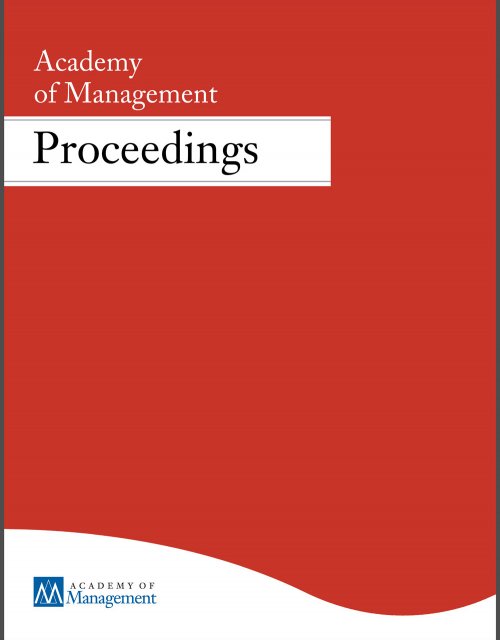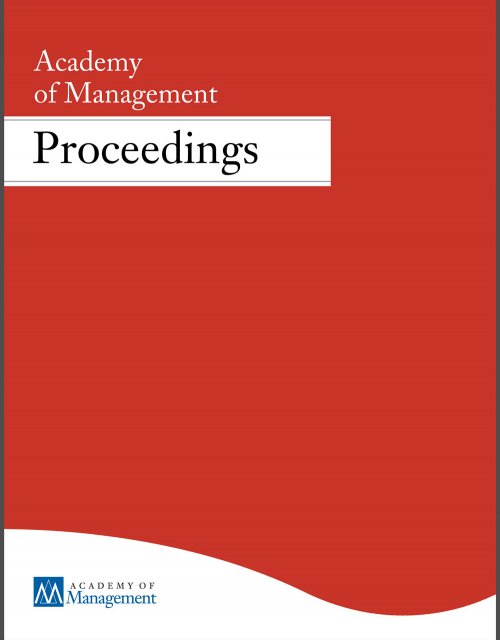Publication records
Subject(s)
Human resources management/organizational behavior; Management sciences, decision sciences and quantitative methods
We develop a novel method that integrates techniques from machine learning with canonical concepts from network analysis in order to examine how the meaning of leadership has evolved over time. Using articles in Harvard Business Review from 1990 through 2019, we induce yearly semantic networks comprised of roles structurally equivalent to the role of leader. Such roles, from which leader derives meaning, vary in content from coach and colleague to commander and dictator. Yearly shifts in the structural equivalence of leader to clusters of thematically-linked roles reveals a decline in the degree to which leadership is associated with consultative activities and a corresponding rise in the extent to which a leader is understood to occupy a hierarchical position. Our analyses further reveal that the role of leader comes to eclipse the role of manager, measured through changes in pagerank centrality as well as betweenness centrality over the course of our panel. Implications for new research on leadership, culture, and networks are discussed."
With permission of the Academy of Management
Volume
2020
ISSN (Online)
2151-6561
ISSN (Print)
0065-0668
Subject(s)
Human resources management/organizational behavior
Keyword(s)
Error management
A major insight of research into organizational error is that there is a critical period between “hoping for better” and “too little too late”. Engaging in the active management of unfolding organizational errors before they evolve into crises (Pearson & Mitroff, 1993) becomes a strategic concern in itself – one that challenges classic approaches (Edmondson & Verdin, 2018; Giolito & Verdin, 2018). Recent research suggests that the management of organizational errors (e.g. Frese & Keith, 2015; Goodman et al., 2011; Lei, Naveh, & Novikov, 2016) is increasingly a responsibility for top executives, particularly in turbulent contexts where organizations devote increasing time and resources to experimentation. In this session, we turn to the responsibility of corporate boards in strategic error management, defined as the actions taken by organizational actors and that aim to disconnect these errors from strategic failure (Goodman et al., 2011; Hofmann & Frese, 2011; Giolito & Verdin, 2018). Many aspects of strategic failure can only be addressed and corrected by engaging in actions to minimize negative and maximize positive outcomes of the errors as they occur (Frese & Keith, 2015; Hofmann & Frese, 2011a). We assert that it is a core function for organizational actors to engage in and oversee these corrective actions, and that aspects of leadership, governance, and culture play an integral role in the capacity of an organization to respond to errors and avoid crises. Revisiting some of the basic insights of error management, this panel will explore the explicit responsibilities of the board in detecting, recognizing, and dealing with errors in organizations, especially those that affect their long-term success and viability. We will focus on how and when error management takes place and should take place at board level, and what interactive role stakeholders and institutions play in attenuating or magnifying the effects of the board’s behaviors and actions. We look to explore two parallel obligations at board level, both 1) the board’s responsibility for oversight of the error management capability of the organization, and 2) the responsibility for error management of the board’s own activities and functioning. Key questions addressed in this panel will revolve around: What should be the board’s effective functioning related to error management, as distinct from ad hoc crisis management capabilities, risk and compliance, and other frameworks and practices? What role does strategic error management play at the board level with respect to enhancing sustainability, both of the firm itself and of its environment – or even with respect to “planetary boundaries” (Whiteman, Walker & Perego, 2013)? How can error management practice improve the board’s capabilities to offset an organization’s slow drift towards obsolescence or failure? How can we restructure board and governance systems to better “see” the bigger picture, both in terms of major failure and in terms of opportunities missed? How can error management – or a “strategy as learning” perspective (Edmondson & Verdin, 2017, 2018) – help boards catch and address unwanted deviations from strategic goals? Our panel of highly experienced scholars represents several major research streams, as well as organizational and governance practice, with the aim of fostering a rich trans-disciplinary discussion. We plan to reserve ample room for dialogue with the audience, of which practitioners and consultants will hopefully form a significant part.
With permission of the Academy of Management
Volume
2020
ISSN (Online)
2151-6561
ISSN (Print)
0065-0668
Subject(s)
Economics, politics and business environment; Health and environment
Keyword(s)
Coronavirus, globalization, universal basic income, organizational learning, European Union
Coronavirus has been diffused to nearly every country on Earth within a few months, and has unfortunately taken the lives of over 400,000 people globally. This article discusses its impact on global economy and globalization, including a pan-virus-free bubble, the future of European Union, the introduction of universal basic income, and how to prepare for the next crisis.
Journal Pages
60–62
Subject(s)
Technology, R&D management
Keyword(s)
Cybersecurity, Cybersicherheit, hackback
The article analyses the proposed hack back/active cyber defence legislation from the perspective of international law. It concludes that while such a policy would not be contrary to Germany's obligations under international law per se, it would be hard to justify in the majority of cases. This is because the remedies self-defence and countermeasures will likely be unavailable due to the persistent problem of timely attribution of cyber operations, and the requirements of the alternative plea of necessity will rarely be met in practice.
Subject(s)
Strategy and general management; Technology, R&D management
Keyword(s)
Digital sovereignty, technology, EU, 5G, cybersecurity
For more than a year, EU member states have been debating whether and how to restrict the participation of the Chinese technology group Huawei in the expansion of their 5G mobile networks. Caught between its two main trading partners, the US and China, the EU is facing a geopolitical test on several levels. Will Europe be able to ensure the security and reliability of digital infrastructures of key economic and social importance? Will it lead the way in 5G and the associated next wave of industrialisation, or will lose out on innovation? How should EU member states deal with their dependence on foreign technologies and strengthen its "digital sovereignty", a political priority of the EU Commission under Ursula von der Leyen? The latter in particular could be the most important strategic challenge the EU has to face in the long term - especially in the context of the intensifying trade conflict between the US and China and the threat of a "decoupling" of technological supply chains.
[Über ein Jahr lang debattieren EU-Mitgliedsstaaten bereits darüber, ob und wie sie die Beteiligung des chinesischen Technologiekonzerns Huawei an dem Ausbau ihrer 5G-Mobilfunknetze einschränken sollen. Gefangen zwischen ihren beiden wichtigsten Handelspartnern, den USA und China, steht die EU vor einem geopolitischen Test auf mehreren Ebenen. Wird Europa langfristig in der Lage sein, die Sicherheit und Zuverlässigkeit digitaler Infrastrukturen von zentraler Bedeutung für Wirtschaft und Gesellschaft zu gewährleisten? Wird es bei 5G und der damit verbundenen nächsten Welle der Industrialisierung tonangebend sein oder weiter an Innovationskraft verlieren? Wie sollen die EU-Mitgliedsstaaten mit der Abhängigkeit von ausländischen Technologien umgehen und jene „digitale Souveränität“ erreichen, deren Stärkung eine der politischen Prioritäten der EU-Kommission unter Ursula von der Leyen ist? Insbesondere letztere könnte die wichtigste strategische Herausforderung sein, der sich die EU langfristig stellen muss – vor allem im Kontext des sich intensivierenden Handelskonflikts zwischen den USA und China und einer drohenden „Entkopplung“ technologischer Lieferketten.]
[Über ein Jahr lang debattieren EU-Mitgliedsstaaten bereits darüber, ob und wie sie die Beteiligung des chinesischen Technologiekonzerns Huawei an dem Ausbau ihrer 5G-Mobilfunknetze einschränken sollen. Gefangen zwischen ihren beiden wichtigsten Handelspartnern, den USA und China, steht die EU vor einem geopolitischen Test auf mehreren Ebenen. Wird Europa langfristig in der Lage sein, die Sicherheit und Zuverlässigkeit digitaler Infrastrukturen von zentraler Bedeutung für Wirtschaft und Gesellschaft zu gewährleisten? Wird es bei 5G und der damit verbundenen nächsten Welle der Industrialisierung tonangebend sein oder weiter an Innovationskraft verlieren? Wie sollen die EU-Mitgliedsstaaten mit der Abhängigkeit von ausländischen Technologien umgehen und jene „digitale Souveränität“ erreichen, deren Stärkung eine der politischen Prioritäten der EU-Kommission unter Ursula von der Leyen ist? Insbesondere letztere könnte die wichtigste strategische Herausforderung sein, der sich die EU langfristig stellen muss – vor allem im Kontext des sich intensivierenden Handelskonflikts zwischen den USA und China und einer drohenden „Entkopplung“ technologischer Lieferketten.]
Pages
10
Subject(s)
Strategy and general management; Technology, R&D management
ISSN (Print)
0017-8012
Subject(s)
Diversity and inclusion; Ethics and social responsibility
Keyword(s)
sustainability, corporate responsibility, climate change, gender equality, diversity, millennials, stakeholder engagement
Our work as educators and researchers, we’ve noticed that two issues are more salient for #youngtalent than for many leaders at top companies: global warming and gender diversity. How can companies understand young people’s perspectives and gather their creative ideas for driving business and doing good?
ISSN (Print)
0015-6914
Keyword(s)
COVID-19, WHO, international law, international responsibility, International Court of Justice, reparation, compensation, pandemic, International Health Regulations, no harm principle, causality
Subject(s)
Information technology and systems; Strategy and general management
Keyword(s)
Digitale Identitäten, E-Governance, Innovation, Digitalpolitik
Am 4. März 2020 war das Digital Society Institute der ESMT Gastgeber der Konferenz Digitale Identitäten 2020, die unter der Schirmherrschaft des Bundesministeriums des Innern, für Bau und Heimat sowie des Bundesministeriums für Wirtschaft und Energie an der ESMT ausgerichtet wurde. Ziel der Konferenz war es, gemeinsam mit Stakeholdern aus Politik, Wissenschaft und Wirtschaft der Frage nachzugehen, wie eine sektorübergreifende Strategie für digitale Identitäten aussehen kann. Im Plenum und in vier sektoralen Workshops – in den Bereichen Bildung, Gesundheit, Mobilität und öffentlicher Verwaltung – diskutierten die Teilnehmerinnen und Teilnehmer über Anforderungen an digitale Identitäten, innersektorale Strategien zur Flächendeckung innerhalb des Sektors sowie über eine Strategie für eine sektorübergreifende digitale Identität.
Pages
7
Subject(s)
Strategy and general management; Technology, R&D management
Keyword(s)
5G, technological sovereignty, Europe, cybersecurity, industrial policy
The challenges that the EU faces with 5G go beyond cyber and national security threats. For Europe, the rollout of the 5G infrastructure has become a geopolitical test on several levels. Will Europe be a shaper or taker of 5G technology and the new era of industrialization it promises to propel? How will it be able to control the security and reliability of such key digital infrastructures in the long-term? Eventually, how should EU member states manage their dependencies on foreign technologies and strengthen their “technological sovereignty” – a political priority of the incoming EU Commission led by Ursula von der Leyen? The latter might be the most important strategic issue the EU will need to tackle in the long-term and will be decisive for the Union’s ability to shape its own future in the digital age.
Secondary Title
The convergence puzzle: Australia, Germany and emerging cybersecurity trends
Pages
35–40

